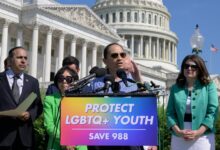Protecting Your Peace: Strategies for Resilience from Legislative Attacks

Nationally, LGBTQ+ people continue to experience greater visibility and overall acceptance. According to a recent Gallup poll, over 7% of the US population identifies as LGBTQ, with roughly one in five members of Gen Z (born 1997–2003) identifying as such. While roughly two-thirds of Americans believe same-sex relations are morally acceptable, a decrease from its height of 71% in 2022, this still represents an overall increase over the past several years.
Despite these favorable trends, or perhaps alongside them, the introduction of state-level anti-LGBTQ legislation showed a substantial rise in 2023. According to the American Civil Liberties Union (ACLU), 510 bills were introduced, slightly over double the 250 bills introduced in 2021. Proposed laws included a wide focus across areas ranging from education to healthcare to the governance of public spaces and services.
According to the American Civil Liberties Union (ACLU), 510 bills were introduced, slightly over double the 250 bills introduced in 2021.
Whatever You Do, Don’t Say Gay…
“Don’t say gay” bills are prominent in educational settings and are intended to prevent teachers and administrators from discussing LGBTQ-related topics in school settings with young children, typically students between kindergarten and elementary-school grade levels. Those in support of “Don’t say gay” bills also assert that parents are stripped of their opportunity to present information related to the LGBTQ+ community in the way that they see fit. Proponents of these bills also argue that an introduction to the LGBTQ+ “lifestyle” holds the potential to convert or encourage young children to engage in queerness, or exposes children to topics related to sexual behavior too soon.
This type of thinking is rooted in the homophobic and transphobic ideas that LGBTQ+ identity is a choice and that others can be converted just by exposure to the mere idea of it. Further, it suggests that being LGBTQ+ is primarily about sex rather than love, a belief that does not transfer equally to heterosexuality, where straight identity is more easily (and historically) rooted in ideas regarding family and morality.
Opponents of these bills rightly assert that just because a topic is introduced in the school setting—oftentimes outside of the control of the teacher—this does not remove the opportunity for parents to responsibly discuss with their children topics related to sexuality. Conversations with children about the complexity of sexuality is actually an important part of parenting, particularly when tailored to the specific child and at the appropriate age level. Rather than trying to erase these conversations from the educational setting, it may be more important for parents, caregivers, and families to partner with schools to craft curriculum that is both accurate and inclusive.
Gender and Identity Wars
Members of the trans and gender diverse (TGD) community are faced with particularly hateful attacks. Laws that limit the ability to change identification to reflect gender identity and/or chosen names unfairly target TGD persons, adding further complication to the simple act of existence. And although it may be hard to believe at this point, we are still fighting against “bathroom bills” when there is no evidence to suggest that people are in danger from the use of public restroom facilities by TGD people that corresponds to their gender identity.
Just as alarming, we have witnessed restriction of the provision of gender-affirming healthcare across a variety of settings. In Texas, the passage of Senate Bill 14 (SB14) prohibits physicians and other healthcare workers from offering specific gender-affirming healthcare interventions such as puberty blockers and/or hormonal therapy to persons under the age of 18, even when parents might consent.
Sadly, legislative attacks such as these are superimposed upon a backdrop of limited protections for LGBTQ people in regard to housing and job discrimination, disparities in access to health services, and an increased threat of violence. In addition to the substantial uptick in anti-LGBTQ legislation, the ACLU reports that, despite representing only 7% of the US population, one in five (20%) reported hate crimes involves someone from the LGBTQ+ community.
When faced with attacks both in the legislature and the world, how can one manage to simply remain afloat?
Remember the Basics
The act of self-care can begin quite simply with a focus on the body. Making healthy decisions regarding diet, setting a bedtime to ensure adequate sleep, and getting physically active can help to reset one’s mood, restore energy, and increase a sense of vitality. A practice of mindfulness through meditation, journaling, or quiet reflection can help you to feel grounded or less anxious from mental or emotional chatter. Trying various strategies can allow you to create the self-care routine that works best for you. Over time, as you incorporate more skills and activities that are effective with reducing stress, you are likely to find that you have more mental and physical energy to deal with anti-LGBTQ sentiment.
Finding Opportunities to Engage in Activism
As you take care of yourself, it becomes easier to take care of others. Is there an area of community about which you feel particularly passionate? Perhaps you are drawn to volunteerism with youth and adolescents, or you’re interested in supporting work in education, healthcare, or the arts. Use your areas of interest as the foundation for engaging in activism. There are plenty of local and national organizations that can benefit from assistance. While it can be nice to support with dollars, the gifts of your time and talent go just as far. Perhaps there is an area of activism that would benefit from your involvement while creating safer spaces for LGBTQ+ people.
Relationship Management
While there may be little choice over whether or not one must deal with attacks from outside of the community, you have agency over who is allowed into your circle. There are times when it becomes necessary to consider leaving relationships and situations which no longer serve as spaces of mutual care and support. Evaluate the extent to which your relationships are adding to your overall quality of life.
Now is an especially important time to aggressively protect your peace. What other strategies can you adopt that will help you to maintain your sense of stability during turbulent times?










